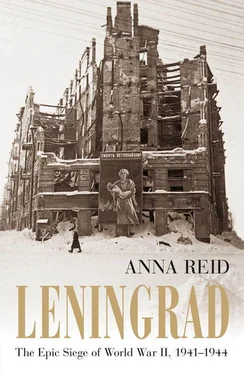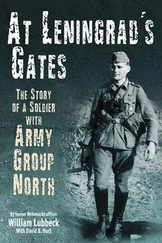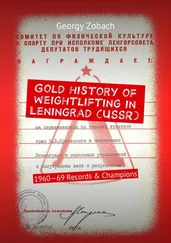Over the following few weeks, Party workers organised highly choreographed but nevertheless semi-voluntary drives to raise defence funds. At the Kirov Works, older ‘veterans of labour’ appealed to their colleagues to donate jewellery, money, bonds and other valuables, as well as one or more day’s pay. So many items were donated that factory treasurers soon asked that they be delivered directly to the banks. Refusing, at a public meeting, to accept a Party official’s invitation to forgo pay would have been hard. But as the historian Andrei Dzeniskevich—one of the first to mine Leningrad’s wartime archives in the newly free early 1990s—points out, only genuine concern could have induced somebody to ‘give up gold earrings or a single silver spoon, the existence of which nobody else knew about’. {6} 6 Andrei Dzeniskevich, ‘The Social and Political Situation in Leningrad in the First Months of the German Invasion: The Social Psychology of the Workers’, in Robert Thurston and Bernd Bonwetsch, eds, The People’s War: Responses to World War II in the Soviet Union , p. 78.
This wave of patriotic volunteerism also engulfed the city’s intelligentsia, the social group, aside from army officers and senior Party officials, hardest hit by the repressions of the previous five years and thus with the most reason to hate the government. Despite the vast differences of context, the itch for action, among the young at least, was not dissimilar from that which propelled the jingo-fed schoolboys of Edwardian England into the trenches. ‘Hello Irina!’ an eighteen-year-old wrote to his girlfriend that June,
I am going to witness something extraordinary and significant—I’m off to the front! Do you understand what that means? No you don’t.
It’s a test of self—of one’s opinions, taste, character. And that’s not a paradox. Perhaps I’ll be able to understand Beethoven’s music better, and the genius of Lermontov and Pushkin, once I’ve been to war…
Well, there’s no time to write. Now I’ve got an advantage over you. I’m going to plunge into the vortex of life, while you’re destined to keep on swotting away at your books. Am I overdoing it about the books? It’s alright; maybe we’ll see each other again one day. I hold your hands and squeeze them tight—Oleg. {7} 7 Lidiya Ginzburg, Chelovek za pismennym stolom , p. 579.
Older Russians, for whom the Soviet Union was a foreign and hostile country, felt a new identification with their homeland. ‘In the dismay of the first few days’, as the then thirty-nine-year-old literary critic Lidiya Ginzburg later put it, educated Leningraders
wanted to be rid of loneliness, an egoism which intensified fear. It was an instinctive movement… the eternal dream of escape from self; of responsibility, of the supra-personal. It all found absurd expression in an odd feeling of coincidence. The intellectual now wanted for himself the thing that the community wanted from him.
Startlingly, people trained by necessity to disguise and hypocrisy, to never speaking their minds except to their oldest friends, suddenly found themselves sincerely in tune with the popular, state-approved mood. ‘Those not liable for call-up’, Ginzburg remembered, ‘urgently wanted to do something—go to the hospital, offer their services as an interpreter, write an article for the paper, seemingly without wanting to be paid.’ Officialdom did not always know what to do with them. They ‘fell into a machine totally unadapted to such psychological material. With customary rudeness and mistrust… it threw people out of some sections and dragged them into others against their will.’ {8} 8 Ibid., p. 91. Notes to Pages 28–40.
One of the many who identified passionately with her country while loathing its government was Anna Akhmatova. Born in 1889 and brought up in Tsarskoye Selo, a palace town just south of Petersburg, she had won fame before the Revolution as a writer of lyrical, bittersweet love lyrics, travelled round Europe and been sketched—tall, lean and eagle-nosed—by Modigliani. The shadows began to lengthen in the late 1920s, when her ex-husband, the poet Nikolai Gumilev, was arrested and executed, one of the first prominent artists to fall victim to the Bolsheviks. Through the thirties, as all around friends disappeared into the camps, she turned to lecturing and translation, while continuing secretly to compose her own increasingly profound and wrenching poetry; each new work was committed to memory, then the manuscript burned. In 1938 her twenty-six-year-old son was arrested for the third time in five years and sent to the Gulag, where he remained at the outbreak of war. Despite all this, Akhmatova eagerly took up an invitation to make a patriotic broadcast to the ‘women of Leningrad’, and took her turn standing guard duty outside the Sheremetyev Palace on the Fontanka river, where she lived in a cramped and chaotic ménage à trois with her second ex-husband, the art historian Nikolai Punin, and his new wife and daughter.
Another writer who wrestled with the distinction between country and regime was the thirty-one-year-old poet Olga Berggolts. Out of fashion today, Berggolts became famous with February Diary , a cycle of vivid and by the standards of the time outspoken poems, written during the siege’s first winter and broadcast early in 1942. At the war’s start she was still unknown, a junior staff member at the city radio station. Fair and delicate, with a gentle, oval face and wide blue eyes, she knew and admired Akhmatova, but was a generation younger and had grown up a believing Communist, during the idealistic decade after the Revolution. Disillusion had not come until 1937, when her ex-husband was arrested (he was later secretly executed) and she was expelled from the Party and from the Writers’ Union. Berggolts’s own turn came eighteen months later, when she was taken to the prison behind the Ministry of Internal Affairs’ headquarters on the Liteiniy, and kicked in the stomach until she suffered a miscarriage. Seven months later she was released—saved, ironically, by the Terror itself, which had just reached the upper levels of Leningrad’s security services, purging her gaolers in the process.
By the time war broke out two years later, Berggolts had returned to the normal concerns of everyday life—a boozy flirtation with a colleague at the city radio station, hazy thoughts on a possible novel, arrangements for an illegal abortion for her sister. Her diary entry of 22 June reads simply ‘WAR!’, but on that day she also wrote a new, unpublishable poem, which tried to reconcile her fierce disillusionment with Communism as practised under Stalin with her love for her country:
On that day too I did not forget
The bitter years of persecution and sorrow.
But in a blinding flash I understood:
It didn’t happen to me but to You;
It was You who found strength and waited.
No, I have forgotten nothing,
But even the dead and the victims
Will rise from the grave at your call;
We will all rise, and not I alone.
I love you with a new love
Bitter, all-forgiving, bright—
My Motherland with the wreath of thorns
And the bright rainbow over your head…
I love you—I can do no other—
And you and I are one again, as before. {9} 9 Katherine Hodgson, Voicing the Soviet Experience: The Poetry of Olga Berggolts , p. 67; Harrison Salisbury, The 900 Days: The Siege of Leningrad , pp. 121–2.
The men in charge of making sure that public anger at news of the German invasion did not spill into disorder were Zhdanov (who made it back to Leningrad on 26 or 27 June), Petr Popkov, the hot-tempered chairman of the city soviet, and (with the declaration of martial law) Lieutenant General Popov, commander of the Leningrad garrison. Actual fulfilment of the city leadership’s orders rested with the executive committees of the regional, city and fifteen city district soviets. The entire structure took its cues from Moscow: Popov’s Order No. 1 of 27 June, for example, mandating longer working hours, tighter travel restrictions and a curfew, was a verbatim copy of one issued by the Moscow garrison commander two days earlier. ‘It is difficult to avoid the impression’, as one historian puts it, ‘that the Leningrad garrison commander actually copied his order from Pravda .’ {10} 10 Leon Gouré, The Siege of Leningrad , p. 59.
Читать дальше











